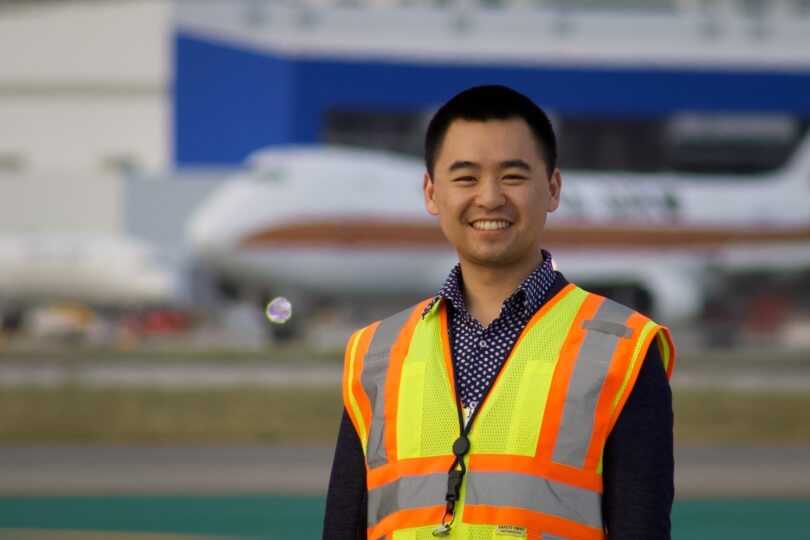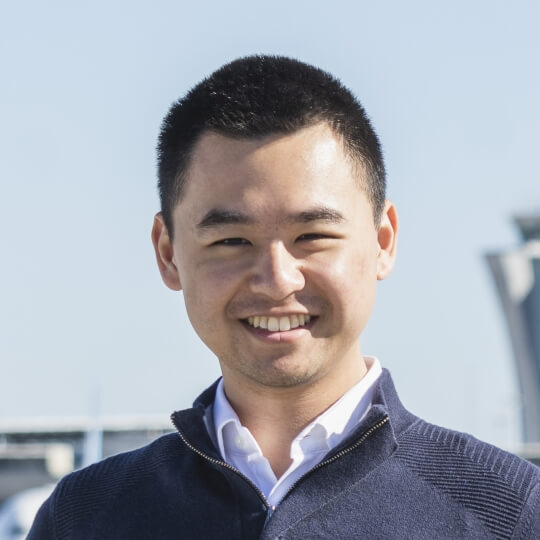Raymond Wang's company, AeroVect, designs electric autonomous vehicles to improve how baggage and cargo is transported across airports.
Raymond Wang’s first airplane flight left a pretty big impression on him. His family moved from China to Vancouver when he was 2 years old, and it didn’t take long for him to develop a fascination with aviation and flight technology.
“I grew up obsessed with planes,” he said. “Going to a new place is always exciting, but the plane ride itself is what makes it really awesome.”
As a high-schooler, Wang presciently designed a new airflow technology that could reduce the spread of diseases in enclosed cabins. His project was for the 2015 Intel International Science and Engineering Fair, which put him face to face with representatives from several major aerospace companies.
“I designed a device that goes into the airflow systems of aircraft, and changes the airflow pattern so that if someone sneezes, the person sitting next to them doesn’t breathe it in,” said Wang, A.B. '20.
Interest in Wang's technology increased when the COVID-19 pandemic began five years later, and the patent was eventually commercialized by a cabin interiors manufacturer based in Washington. At that time, Wang was taking time off from the final semester of his computer science degree at the Harvard John A. Paulson School of Engineering and Applied Sciences (SEAS). He and classmate Eugenio Donati were also already hard at work on another airline innovation: AeroVect, a start-up offering electric autonomous vehicles to improve how baggage and cargo is transported across airports.
“We started to think about what unique things we could contribute to airport operations to make them more efficient and reliable,” Wang said. “We got an old tractor from Indiana, shipped it to the garage at the house we rented in the Bay Area, and got started.”
AeroVect is aiming to address labor shortages, which even pre-pandemic was a major challenge at commercial airports. A lack of workers has led to greatly increased rates of lost or mishandled luggage, and shortages have gotten so bad in the last few years that major airlines have asked higher-level executives to work ground-level jobs.
Along with addressing labor shortages and potentially improving safety for human personnel (fewer people on the tarmacs means lower risk of accidents, especially during inclement weather), Wang also hopes AeroVect’s technology can eventually reduce the airline industry’s impact on climate change. While right now the company is focused on baggage handlers and cargo transports, eventually it could expand to other ground-based airport vehicles, potentially reducing the amount of fuel expended during the taxiing stage of flight.
“Engines don’t operate as efficiently at lower altitudes, so when you’re taxiing, you typically burn about 5 percent of your fuel supply,” Wang said. “An extension from building the autonomous driving system for baggage and cargo tractors is that you can apply it to other vehicles in the same environment. Eventually, instead of having the aircraft taxi out to the beginning of the runway, you could have it sustainably towed by an AeroVect tractor.”
Raymond Wang, A.B. '20
That interest in sustainability recalls Wang’s childhood in Vancouver, which he said “not only talks the talk, but it walks the walk in trying to be a sustainable city.” As a high school student, he founded Sustainable Youth Canada, a nonprofit platform to help high school and university students develop sustainability initiatives.
“One of the challenges of being in high school is that you don’t often get taken seriously as individual students,” he said. “But something different happens when you bring a group of high schoolers together from different parts of Vancouver and Canada and operate as one entity. As an organization, your events become much more legitimate. When you interface with other non-profits, they’re willing to have more serious collaborations with you.”
AeroVect, based out of the Bay Area, currently has 15 engineers in its workforce, but that could expand in the coming years. The company began its initial deployment in San Francisco and Atlanta in 2022, and in September announced a partnership to deploy its vehicles internationally, including at Dubai International Airport.
“We have to make sure the product is really solid and ready for that scale-up,” Wang said. “With our team right now, basically everybody is an engineer. We’ve learned that the conventional wisdom of doubling headcount over and over again isn’t as effective as finding engineers who can deliver on the specific areas we need.”
AeroVect combines Wang’s long-held passions for mechanical engineering and robotics with the interest in computer science, especially machine learning, that he developed at SEAS. His two summer internships while here were at Delta and Microsoft, the latter of which helped him realize how he wanted to use his education in the future.
“If you tell me to work on a productivity tool or software infrastructure, that’s just not for me,” he said. I like doing stuff you can see actually work in the physical world.”
Wang and Donati founded AeroVect in 2021. One of the company’s earliest investors was the Xfund, a venture capital firm with close ties to SEAS.
“I met my co-founder at Harvard,” Wang said. “Even when it came to the early days of learning the start-up ecosystem, being at Harvard exposed me to others that took this path. It broke my perception that you need to be a guy in his 30s to be able to do anything interesting. We couldn’t have done any of this without the one-of-a-kind environment that makes this school so special.”
Press Contact
Matt Goisman | mgoisman@g.harvard.edu

